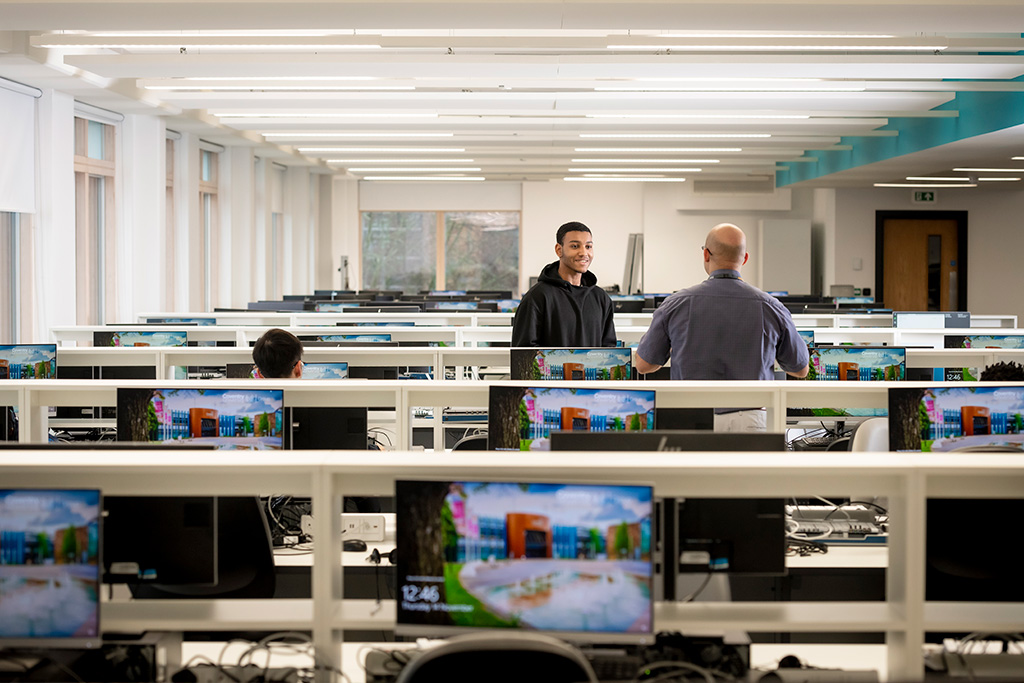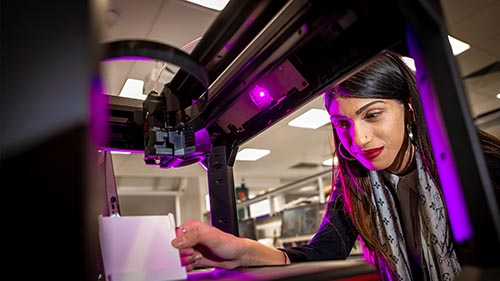Search
Cloud Computing BSc (Hons)
Study level: UndergraduateHNC/HND courses

Cloud Computing is a model for enabling flexible on-demand access to a pool of scalable computing resources that users and businesses can provision rapidly and easily to meet needs.
Course option
Year of entry
Location
CU Coventry (Coventry)
Study mode
Full-time
Sandwich
Duration
3 years full-time
4 years sandwich
2 years (accelerated)
UCAS codes
161I
I160
Start date
September 2025
November 2025
January 2026
March 2026
May 2026
June 2026
Course overview
Our Cloud Computing BSc (Hons) incorporates contemporary issues and approaches in computing, underpinned by fundamental skills in networking, software design, data science, coding, computer hardware and physical infrastructure.
Course content is maintained through working closely with large cloud service providers, ensuring graduates are well placed for employability on completion in a competitive and rapidly developing field.
Why you should study this course
The course is designed to provide successful graduates with the breadth of skills to be effective in the varied digital workplace, developing self-management and self-development capabilities to keep pace with change and adapt to new technologies, software languages and cloud management systems.
Through the course programme you should develop your skills and knowledge in many areas, including:
- Problem-based learning using authentic assessment methods.
- Critical self-development and professional presentation in a technical field
- Techniques and technologies to leverage cloud provisions to meet business requirements.
Accelerated route
This degree course can be completed in two years by studying six modules per year rather than four. The optional sandwich year is not available on this accelerated route.
What you'll study
We regularly review our course content, to make it relevant and current for the benefit of our students. For these reasons, course modules may be updated.
How you'll learn
The course is designed to support your development of essential skills needed to get you employment-ready and into industry quicker.
Our teaching methods are varied to suit the needs of all our students. In addition to lectures, we also utilise a blended learning approach, including online aspects, workshops and group work.
Progression through the modules aims to develop knowledge and skills including communication (written and oral), study skills, research methods, project management, presentation and career development.
Teaching contact hours
As a full-time undergraduate student, you will study modules totalling 120 credits each academic year (180 credits for accelerated route). A typical 20 credit module requires a total of 200 hours study. This is made up of teaching contact hours, guided and independent study.
Teaching hours
Teaching hours vary each semester, year of study and due to module selection. During your first year you can expect 15-18 teaching hours each week. You will also have the option to attend optional sessions including time with a progress coach or to meet with staff for advice and feedback. As you progress through your studies, teaching hours may reduce.
Guided and independent study
Throughout your studies, you will be expected to spend time in guided and independent study to make up the required study hours per module. You’ll be digging deeper into topics, review what you’ve learned and complete assignments. This can be completed around your personal commitments. As you progress through your studies, you’ll spend more time in independent study.
Online learning
As an innovative university, we use different teaching methods including online tools and emerging technologies. So, some of your teaching hours and assessments may be delivered online.
Assessment
This course will be assessed using a variety of methods which will vary depending upon the module.
Assessment methods may include:
- coursework
- presentations
- project work
- quizzes
- artefact submission and demonstrations
- reflective reports or business documents.
The Coventry University Group assessment strategy ensures that our courses are fairly assessed and allows us to monitor student progression towards achieving the intended learning outcomes.
Entry requirements
Typical entry requirements:
Fees and funding
| Student | Full-time | Part-time |
|---|---|---|
| UK, Ireland*, Channel Islands or Isle of Man | 2026/27 fees TBC: 2025/26 fees £11,440 (two-year accelerated study route) | £9,535 (three-year study route) per year |
Not available |
| EU | 2026/27 fees TBC: 2025/26 fees £11,440 (two-year accelerated study route) | £9,535 (three-year study route) per year with EU Support Bursary** 2026/27 fees TBC 2025/26 fees: £27,400 (two-year accelerated study route) | £14,800 (three-year study route) per year without EU Support Bursary** |
Not available |
| International | 2026/27 fees TBC 2025/26 fees: £27,400 (two-year accelerated study route) | £14,800 (three-year study route) per year |
Not available |
If you choose to study this course with a professional placement2 or study abroad year, you will need to pay a tuition fee3 to cover your academic support throughout your placement year. Students commencing their professional placement in the academic year 2027/28 will pay £1,500 if they are paying UK fees, or £1,800 if they are paying international fees.
For advice and guidance on tuition fees and student loans visit our Fees and funding page and see the university’s Tuition Fee and Refund Terms and Conditions.
The University will charge the tuition fees that are stated in the above table for the first Academic Year of study. The University will review tuition fees each year. For UK (home) students, if Parliament permits an increase in tuition fees, the university may increase fees for each subsequent year of study in line with any such changes. Note that any increase is expected to be in line with inflation.
If you choose to study this course with a professional placement, the University will charge the tuition fees stated above for those on a placement during Academic Year 2027/28. The University will review professional placement tuition fees each year. For UK (home) students, the University may increase fees for each subsequent year of study, but such that it will be no more than 5% above inflation.
For international students, we may increase fees each year, but such increases will be no more than 5% above inflation. If you defer your course start date or have to extend your studies beyond the normal duration of the course (e.g. to repeat a year or resit examinations) the University reserves the right to charge you fees at a higher rate and/or in accordance with any legislative changes during the additional period of study.
We offer a range of international scholarships to students all over the world. For more information, visit our international scholarships page.
Tuition fees cover the cost of your teaching, assessments, facilities and support services. There may be additional costs not covered by this fee such as accommodation and living costs, recommended reading books, stationery, printing and re-assessments should you need them.
The following are additional costs not included in the tuition fees:
- Any optional overseas field trips or visits: £400+ per trip.
- Any costs associated with securing, attending or completing a placement (whether in the UK or abroad).
*Irish student fees
The rights of Irish residents to study in the UK are preserved under the Common Travel Area arrangement. If you are an Irish student and meet the residency criteria, you can study in England, pay the same level of tuition fees as English students and utilise the Tuition Fee Loan.
**EU Support Bursary
Following the UK's exit from the European Union, we are offering financial support to all eligible EU students who wish to study an undergraduate or a postgraduate degree with us full-time. This bursary will be used to offset the cost of your tuition fees to bring them in line with that of UK students. Students studying a degree with a foundation year with us are not eligible for the bursary.
Facilities
You will learn in our on-site computer laboratories that are home to industry-standard equipment so that you learn using the same equipment as many industry professionals.
The modern CU Coventry Mile Lane campus has been designed to promote collaboration, creativity, and innovation. Facilities include:
- indoor and outdoor social spaces, including a café
- a library that includes loan laptops, over 115,000 eBooks and a silent study area
- open access IT suites and 83-inch teaching screens
- student support and careers advice teams
CU Coventry students also have access to facilities located on the Coventry University campus. These include the Lanchester Library and The Hub.
Facilities are subject to availability. Access to some facilities (including some teaching and learning spaces) may vary from those advertised and/or may have reduced availability or restrictions where the university is following public authority guidance, decisions or orders.
Careers and opportunities
On completion, you should be able to:
- adapt and gain additional specific competencies
- apply contemporary knowledge and practical skills in Cloud Computing
- develop the combination of skills and knowledge required to undertake research and development work involving technically advanced computer applications
- deploy a range of skills into a global cloud computing market
- develop cognitive, practical and employability skills needed to play a critical role for societal and economic development.
Graduates could move into a variety of jobs in the computing industry such as:
- Cloud Support Associate/Engineer
- Cybersecurity Specialist
- Data Integration Specialist
- Data Scientist
- DevOps Engineer
- Machine Learning
- Web/Software Development Engineer
- Solutions Architect
- Application Developer
Where our graduates work
Graduates of this course have gone on to work at BT, National Rail, AWS, McKesson UK and the NHS.










